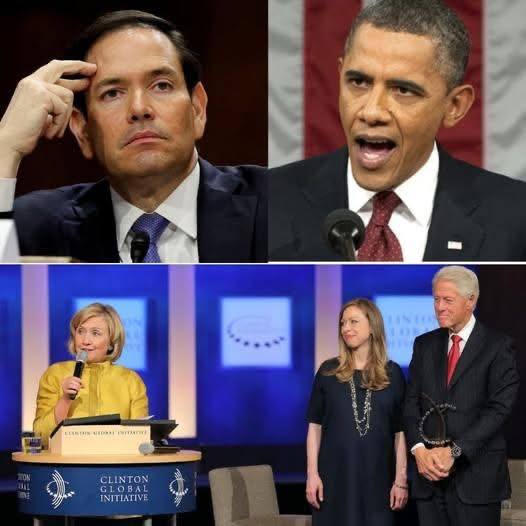Senator Marco Rubio (R-FL) has ignited a political firestorm after delivering what many are already calling the “speech of the year.” Speaking at the Bipartisan Ethics Forum in Washington, D.C., Rubio stunned the audience with an unscripted and fiery address that tore into one of the most controversial institutions in modern American politics: the Clinton Foundation.
For years, the Clinton Foundation has positioned itself as a global charitable organization, touting humanitarian projects from clean water initiatives to public health campaigns. But Rubio, in front of lawmakers, dignitaries, and former presidents, openly challenged that image. His words were sharp, deliberate, and uncompromising.

“Americans have been told for more than ten years that the Clinton Foundation is a force for good,” Rubio declared, his voice rising as cameras zoomed in. “But what if I told you it was something else entirely—a global ATM for unchecked foreign interference, hidden influence, and political favors?”
The remarks landed like a thunderclap. Gasps echoed in the hall as Rubio accused the foundation of operating as a channel for dubious financial dealings and foreign influence. He alleged that behind its humanitarian branding lay networks of questionable transactions, concealed agreements, and covert political favors.
According to Rubio, these activities have not only undermined public trust but also compromised the integrity of American politics. His call was direct and uncompromising: he demanded a federal investigation into the foundation’s international operations and financial practices.
The tension in the room was palpable. Audience members shifted uneasily in their seats. Some stared down, unwilling to meet the senator’s gaze. Others sat frozen in silence, caught off guard by the unfiltered confrontation. At one point, cameras captured former President Barack Obama, who was in attendance, looking visibly unsettled as Rubio’s accusations grew more pointed. That single image quickly spread across social media, further fueling the frenzy around the speech.
Observers described the atmosphere as unlike anything they had seen at a bipartisan gathering in years. What was intended to be a forum on ethics and transparency had suddenly transformed into a stage for one of the boldest political attacks of Rubio’s career.
Political analysts quickly weighed in, calling the speech a defining moment for the Florida senator. “Rubio has taken a calculated risk,” one analyst noted. “By going off-script and targeting the Clintons so directly, he has forced Washington to revisit a debate many thought had faded.”
Indeed, the fallout could prove significant. While it remains uncertain whether Rubio’s words will trigger an official investigation, his accusations have thrust the Clinton Foundation back into the national spotlight—a place it has not been in years. For critics of the foundation, Rubio’s remarks validated long-held suspicions. For supporters, they represented a dangerous escalation of partisan attacks.
Either way, the senator succeeded in placing himself at the center of a renewed debate over accountability in government. His speech has already dominated headlines, sparking conversations about transparency, ethics, and the influence of foreign money in American politics.
For Rubio, this moment may well mark a turning point in his career. Once viewed as cautious and calculated, he has now positioned himself as an unflinching voice willing to confront powerful institutions head-on. Whether the speech leads to tangible consequences for the Clinton Foundation remains to be seen—but in Washington, one thing is clear: Marco Rubio has changed the conversation, and the reverberations of his words are only just beginning.